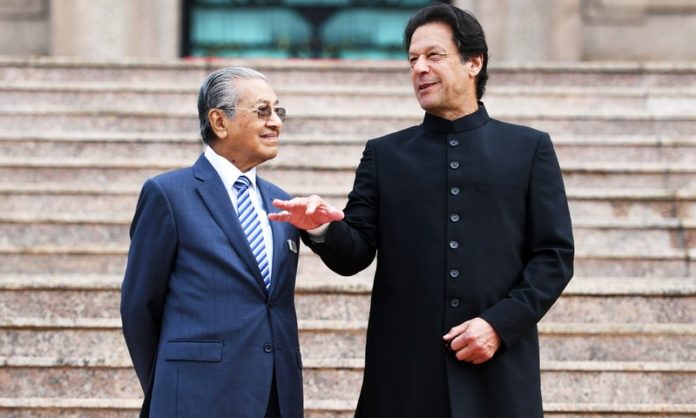- ‘PM Khan has taken note of the good practices adopted by the Malaysian govt to track down corruption and white-collar crimes’
ISLAMABAD: The biggest takeaway from Prime Minister Imran Khan’s visit to Malaysia is Prime Minister Mahathir Mohamad’s commitment to plug the imbalance in bilateral trade, according to an official source in the Prime Minister Imran Khan’s entourage.
The official informed Pakistan Today that the success of the PM’s visit to Malaysia could be gauged by the fact that Malaysia agreed to increase imports from Pakistan. “We have identified the areas where Malaysia can benefit from Pakistani exports. I believe our companies have the potential to meet the market demands of Malaysia,” the source said, refusing to identify the areas agreed upon between the two prime ministers.
The official said the level of personal relations between Prime Minister Imran and Premier Mahathir was evident when the latter, despite being an old man, showed a special gesture by seeing off the former at the airport.
“Pakistani High Commissioner in Malaysia Nafees Zakaria had worked extensively behind the scenes to make the visit a major success. His input proved to be very useful for the prime minister whose personal bonding with his Malaysian counterpart also worked wonders for Pakistan’s cause,” the source revealed. “Malaysian leaders also showed special interest in expanding defence cooperation between the two countries.”
He said that this was the first state visit by any world leader to Malaysia after Premier Mahathir Muhammad took office. Moreover, he added, Imran Khan became the only head of a government to undertake a state visit to Malaysia in two decades. He also claimed that it was also the only visit by any Pakistani leader to Malaysia in 16 years.
Asked whether no Pakistani leader in past had visited Malaysia in the last two decades, the official said that there was a difference between a state visit and a visit to attend a world moot.
“Pakistani leaders may have visited Kuala Lumpur in the past to attend conferences but it was the first state visit by any Pakistani head of government in two decades,” the official remarked.
Asked why was it being termed as first visit by any world leader as Indian Prime Minister Narendra Modi had recently visited Malaysia, the official said there was a difference between a state visit and a transit visit. “Indian premier had a two-hour transit at Malaysian airport and PM Mahathir had paid him a courtesy call. This can’t be taken as an official state visit,” the official asserted, adding that Modi was not given a state reception.
On the contrary, the official said, PM Imran Khan’s visit was given an official reception, a guard of honour while the diplomatic corps and the armed forces were lined up to greet the PM. He added that PM Khan was hosted for an official banquet while a special meeting with the Malaysian King was also held.
The official said that during his meeting with the Malaysian investors, the Malaysian business leaders expressed keen interest in investment opportunities in Pakistan. The potential sectors included telecom, education, modern technologies, halal industries, tourism, gemstones, solid waste management and renewable energy, heavy industries, and infrastructure development projects with a specific focus on affordable housing projects.
The official said that the PM’s interaction with the Pakistani community in Kuala Lumpur was also important as most guests belonged to academia, service sector and the business community. “Prime Minister Khan had shown keen interest in the good practices Malaysian government had adopted to track down corruption with an emphasis on tracking white collar crimes,” he concluded.




